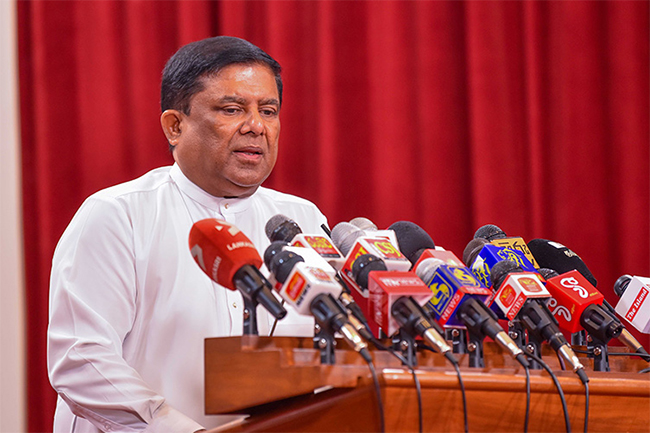UNP chairman refutes opposition’s allegations of election delay
March 27, 2024 10:04 pm
United National Party (UNP) chairman, MP Wajira Abeywardena has vehemently refuted the claims made by the opposition about the possible delay of the forthcoming elections.
He stressed that the election amendment bills recently tabled in parliament will not impact the prearranged schedule of the elections, which he said are set to duly take place in compliance with constitutional regulations.
Abeywardena alleged that opposition factions lacking clear slogans are resorting to misleading tactics by spreading false propaganda about the intention of the government to postpone elections.
The parliamentarian highlighted that the group led by the President possesses the resilience to confront the upcoming elections with vigour.
Addressing a press briefing titled “Collective Path to a Stable Country” held at the Presidential Media Centre today (27), MP Abeywardena further commented:
The country did not face bankruptcy due to incidents occurring in one two days. This situation has been evolving over a significant timeframe, marked by a prolonged war that required the allocation of national funds for purchasing weapons, thus sustaining the conflict for three decades. Consequently, the economy suffered a severe downturn due to this protracted period of warfare. Furthermore, a substantial financial loss amounting to trillions of dollars was incurred in 1971.
The terrible situation in 1987 and 1988 resulted in significant loss of lives and severe economic repercussions. Victims included monks, police officers, members of other security forces, politicians, and individuals from various sectors. Professor Stanley Wijesundara from Colombo University was also among those who lost their lives.
During that period, the nation mourned the loss of numerous journalists, religious figures, and highly skilled estate superintendents. It was amidst this backdrop that President Ranil Wickremesinghe advocated for a unified effort. He stressed the importance of setting aside differences and rallying together to promote national policies.
Still, they are implementing within the parliament. The President has highlighted this policy in the decrees presented. Notably, some of the most robust financial control bills in Asia have been approved and enacted by the parliament, aiming to curb corruption and irregularities effectively. The legal framework now encompasses regulations concerning monetary transactions, ensuring fair treatment where no one can be labelled unfairly. It is important to note that our goal is to enforce the law consistently and without bias.
Furthermore, the President is preparing to introduce additional special decrees to Parliament concerning the management of the country’s economy. Following Sri Lanka’s financial crisis, President Ranil Wickremesinghe announced a halt to money printing. However, measures were reluctantly taken to boost the country’s tax revenue.
Despite facing numerous challenges, we remained committed to providing relief to the people. Insurance benefits were raised to Rs. 15,000, and government employee salaries were increased by Rs. 10, 000. Additionally, the “Urumaya” program was initiated to grant freehold deeds to two million individuals in the country.
President Ranil Wickremesinghe has undertaken significant initiatives within a brief timeframe. Traditionally, presidents have served six or twelve-year terms in this nation. Yet, none have exhibited the level of action and achievement as the current president, particularly considering the challenges of managing a financially distressed country. Given these accomplishments, there is widespread support for endorsing him for the presidency in the upcoming election.
Furthermore, it is crucial to strategize on how to leverage his capabilities in the future. Any deviation from this course could lead to a return to the era of shortages in fuel and gas cylinders. Hence, caution and meticulous planning are paramount. Certain groups within the nation are disrupting the prevailing political landscape and inciting divisive politics. To steer Sri Lanka towards freedom from domestic and foreign influences and elevate it to a prominent position in Asia, the Sri Lankan populace must act thoughtfully in this regard.
As per the constitutional stipulations, the presidential election must be conducted before October 17, and a general election should also follow suit in compliance with the constitution.
Regarding the election amendments, they are not proposed with the intention of postponing elections. The claim is made that opposition groups lack clear slogans, leading to their reluctance to hold elections. There is no necessity to delay elections, especially as efforts are underway to address the country’s financial challenges, which has left opposition groups without clear platforms.
Over the past three years, the public has been deprived of the opportunity to celebrate the New Year. However, President Ranil Wickremesinghe has successfully fostered an environment conducive to New Year celebrations this time around. His efforts in bolstering the country’s economy have earned him the gratitude of the entire populace.
--PMD












